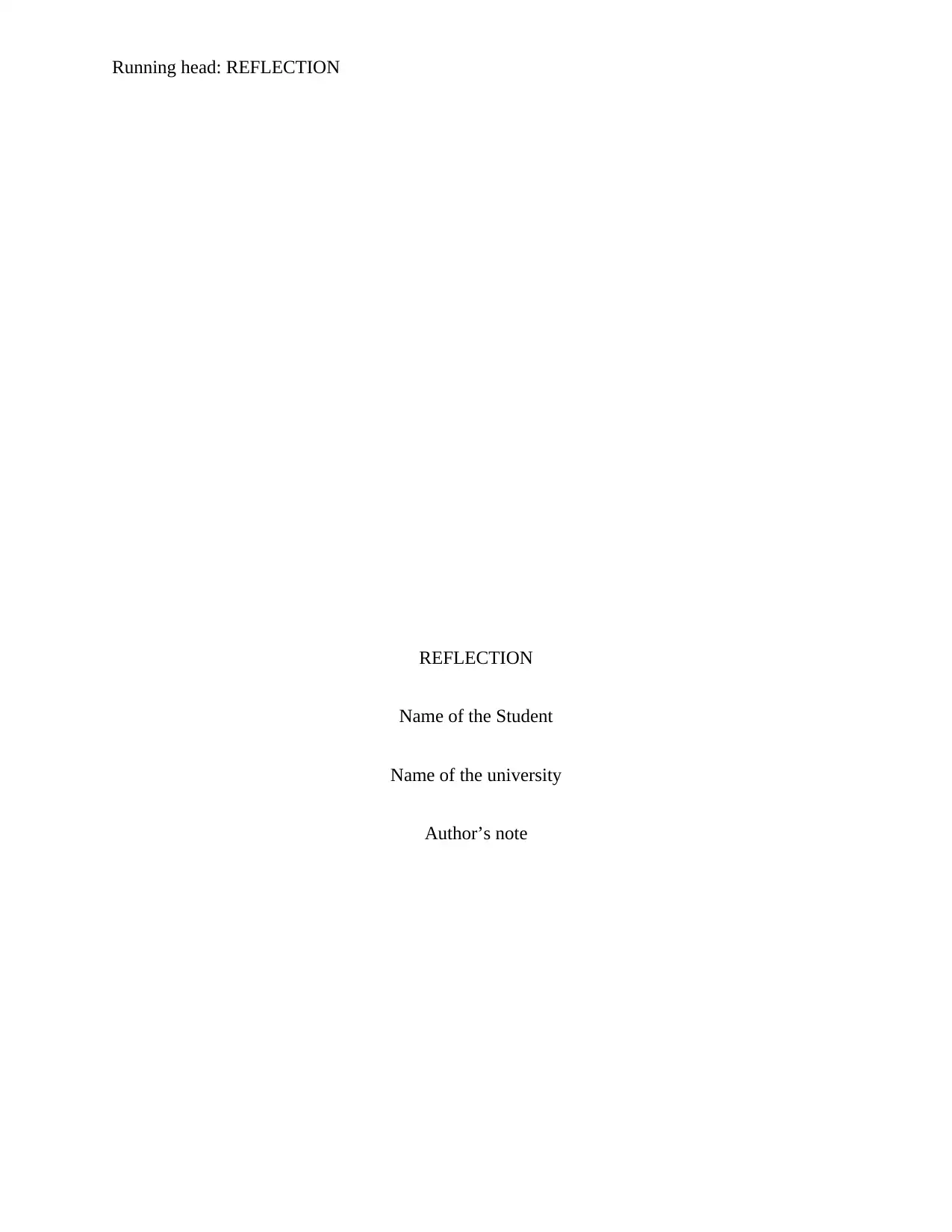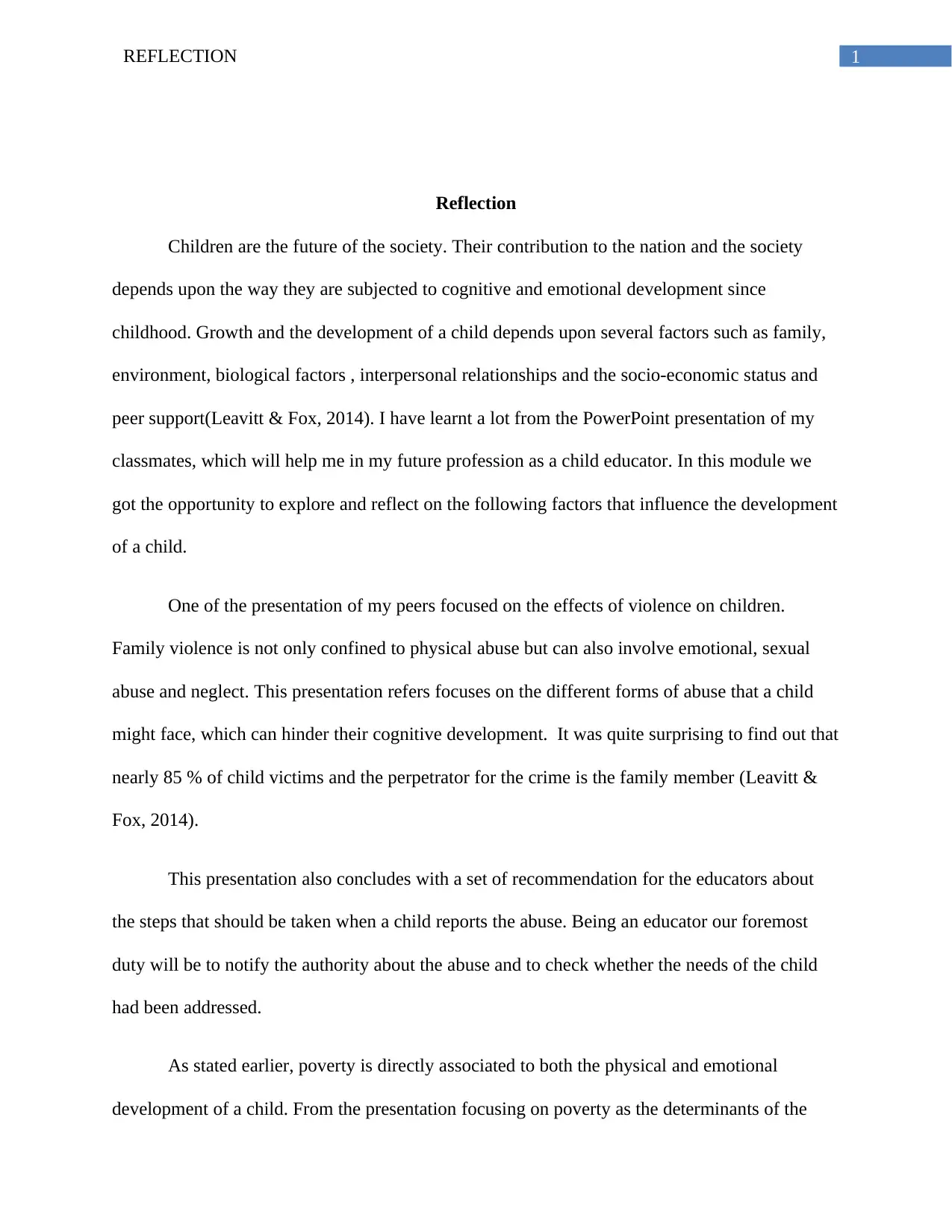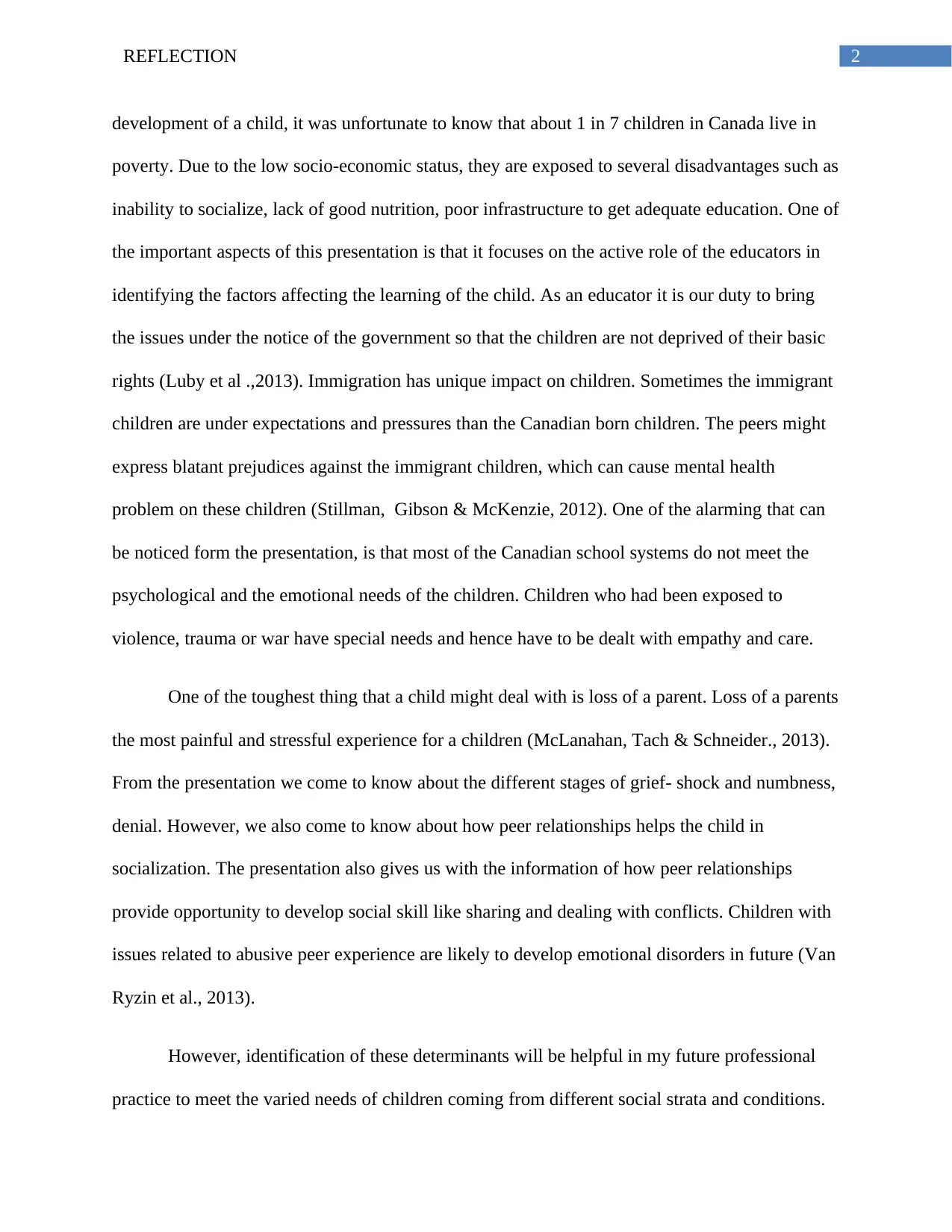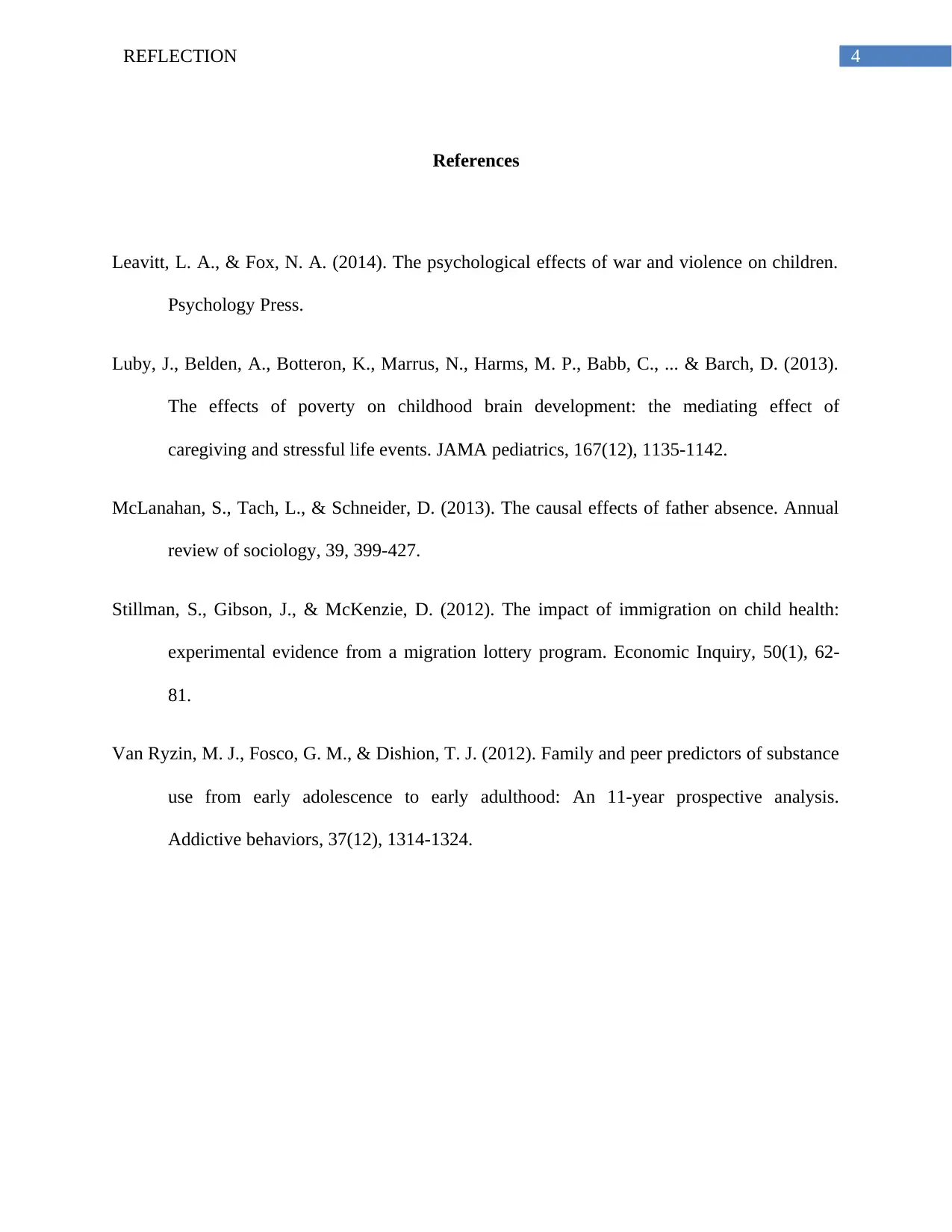University Child Development I (ECDV 110) Reflection
VerifiedAdded on 2023/05/31
|5
|917
|290
Journal and Reflective Writing
AI Summary
This reflective assignment explores various factors influencing child development, based on a student's learning from classmates' presentations in an ECDV 110 course. The reflection covers the impact of family violence, poverty, immigration, and peer relationships on children's cognitive and emotional growth. It highlights the importance of educators in identifying and addressing issues such as child abuse, the effects of low socio-economic status, and the challenges faced by immigrant children. The assignment emphasizes the need for empathy and care for children exposed to trauma or loss, and discusses the role of peer relationships in socialization. The student aims to apply these insights in their future career as a child educator, to meet the diverse needs of children from different backgrounds.

Running head: REFLECTION
REFLECTION
Name of the Student
Name of the university
Author’s note
REFLECTION
Name of the Student
Name of the university
Author’s note
Paraphrase This Document
Need a fresh take? Get an instant paraphrase of this document with our AI Paraphraser

1REFLECTION
Reflection
Children are the future of the society. Their contribution to the nation and the society
depends upon the way they are subjected to cognitive and emotional development since
childhood. Growth and the development of a child depends upon several factors such as family,
environment, biological factors , interpersonal relationships and the socio-economic status and
peer support(Leavitt & Fox, 2014). I have learnt a lot from the PowerPoint presentation of my
classmates, which will help me in my future profession as a child educator. In this module we
got the opportunity to explore and reflect on the following factors that influence the development
of a child.
One of the presentation of my peers focused on the effects of violence on children.
Family violence is not only confined to physical abuse but can also involve emotional, sexual
abuse and neglect. This presentation refers focuses on the different forms of abuse that a child
might face, which can hinder their cognitive development. It was quite surprising to find out that
nearly 85 % of child victims and the perpetrator for the crime is the family member (Leavitt &
Fox, 2014).
This presentation also concludes with a set of recommendation for the educators about
the steps that should be taken when a child reports the abuse. Being an educator our foremost
duty will be to notify the authority about the abuse and to check whether the needs of the child
had been addressed.
As stated earlier, poverty is directly associated to both the physical and emotional
development of a child. From the presentation focusing on poverty as the determinants of the
Reflection
Children are the future of the society. Their contribution to the nation and the society
depends upon the way they are subjected to cognitive and emotional development since
childhood. Growth and the development of a child depends upon several factors such as family,
environment, biological factors , interpersonal relationships and the socio-economic status and
peer support(Leavitt & Fox, 2014). I have learnt a lot from the PowerPoint presentation of my
classmates, which will help me in my future profession as a child educator. In this module we
got the opportunity to explore and reflect on the following factors that influence the development
of a child.
One of the presentation of my peers focused on the effects of violence on children.
Family violence is not only confined to physical abuse but can also involve emotional, sexual
abuse and neglect. This presentation refers focuses on the different forms of abuse that a child
might face, which can hinder their cognitive development. It was quite surprising to find out that
nearly 85 % of child victims and the perpetrator for the crime is the family member (Leavitt &
Fox, 2014).
This presentation also concludes with a set of recommendation for the educators about
the steps that should be taken when a child reports the abuse. Being an educator our foremost
duty will be to notify the authority about the abuse and to check whether the needs of the child
had been addressed.
As stated earlier, poverty is directly associated to both the physical and emotional
development of a child. From the presentation focusing on poverty as the determinants of the

2REFLECTION
development of a child, it was unfortunate to know that about 1 in 7 children in Canada live in
poverty. Due to the low socio-economic status, they are exposed to several disadvantages such as
inability to socialize, lack of good nutrition, poor infrastructure to get adequate education. One of
the important aspects of this presentation is that it focuses on the active role of the educators in
identifying the factors affecting the learning of the child. As an educator it is our duty to bring
the issues under the notice of the government so that the children are not deprived of their basic
rights (Luby et al .,2013). Immigration has unique impact on children. Sometimes the immigrant
children are under expectations and pressures than the Canadian born children. The peers might
express blatant prejudices against the immigrant children, which can cause mental health
problem on these children (Stillman, Gibson & McKenzie, 2012). One of the alarming that can
be noticed form the presentation, is that most of the Canadian school systems do not meet the
psychological and the emotional needs of the children. Children who had been exposed to
violence, trauma or war have special needs and hence have to be dealt with empathy and care.
One of the toughest thing that a child might deal with is loss of a parent. Loss of a parents
the most painful and stressful experience for a children (McLanahan, Tach & Schneider., 2013).
From the presentation we come to know about the different stages of grief- shock and numbness,
denial. However, we also come to know about how peer relationships helps the child in
socialization. The presentation also gives us with the information of how peer relationships
provide opportunity to develop social skill like sharing and dealing with conflicts. Children with
issues related to abusive peer experience are likely to develop emotional disorders in future (Van
Ryzin et al., 2013).
However, identification of these determinants will be helpful in my future professional
practice to meet the varied needs of children coming from different social strata and conditions.
development of a child, it was unfortunate to know that about 1 in 7 children in Canada live in
poverty. Due to the low socio-economic status, they are exposed to several disadvantages such as
inability to socialize, lack of good nutrition, poor infrastructure to get adequate education. One of
the important aspects of this presentation is that it focuses on the active role of the educators in
identifying the factors affecting the learning of the child. As an educator it is our duty to bring
the issues under the notice of the government so that the children are not deprived of their basic
rights (Luby et al .,2013). Immigration has unique impact on children. Sometimes the immigrant
children are under expectations and pressures than the Canadian born children. The peers might
express blatant prejudices against the immigrant children, which can cause mental health
problem on these children (Stillman, Gibson & McKenzie, 2012). One of the alarming that can
be noticed form the presentation, is that most of the Canadian school systems do not meet the
psychological and the emotional needs of the children. Children who had been exposed to
violence, trauma or war have special needs and hence have to be dealt with empathy and care.
One of the toughest thing that a child might deal with is loss of a parent. Loss of a parents
the most painful and stressful experience for a children (McLanahan, Tach & Schneider., 2013).
From the presentation we come to know about the different stages of grief- shock and numbness,
denial. However, we also come to know about how peer relationships helps the child in
socialization. The presentation also gives us with the information of how peer relationships
provide opportunity to develop social skill like sharing and dealing with conflicts. Children with
issues related to abusive peer experience are likely to develop emotional disorders in future (Van
Ryzin et al., 2013).
However, identification of these determinants will be helpful in my future professional
practice to meet the varied needs of children coming from different social strata and conditions.
⊘ This is a preview!⊘
Do you want full access?
Subscribe today to unlock all pages.

Trusted by 1+ million students worldwide

3REFLECTION
Paraphrase This Document
Need a fresh take? Get an instant paraphrase of this document with our AI Paraphraser

4REFLECTION
References
Leavitt, L. A., & Fox, N. A. (2014). The psychological effects of war and violence on children.
Psychology Press.
Luby, J., Belden, A., Botteron, K., Marrus, N., Harms, M. P., Babb, C., ... & Barch, D. (2013).
The effects of poverty on childhood brain development: the mediating effect of
caregiving and stressful life events. JAMA pediatrics, 167(12), 1135-1142.
McLanahan, S., Tach, L., & Schneider, D. (2013). The causal effects of father absence. Annual
review of sociology, 39, 399-427.
Stillman, S., Gibson, J., & McKenzie, D. (2012). The impact of immigration on child health:
experimental evidence from a migration lottery program. Economic Inquiry, 50(1), 62-
81.
Van Ryzin, M. J., Fosco, G. M., & Dishion, T. J. (2012). Family and peer predictors of substance
use from early adolescence to early adulthood: An 11-year prospective analysis.
Addictive behaviors, 37(12), 1314-1324.
References
Leavitt, L. A., & Fox, N. A. (2014). The psychological effects of war and violence on children.
Psychology Press.
Luby, J., Belden, A., Botteron, K., Marrus, N., Harms, M. P., Babb, C., ... & Barch, D. (2013).
The effects of poverty on childhood brain development: the mediating effect of
caregiving and stressful life events. JAMA pediatrics, 167(12), 1135-1142.
McLanahan, S., Tach, L., & Schneider, D. (2013). The causal effects of father absence. Annual
review of sociology, 39, 399-427.
Stillman, S., Gibson, J., & McKenzie, D. (2012). The impact of immigration on child health:
experimental evidence from a migration lottery program. Economic Inquiry, 50(1), 62-
81.
Van Ryzin, M. J., Fosco, G. M., & Dishion, T. J. (2012). Family and peer predictors of substance
use from early adolescence to early adulthood: An 11-year prospective analysis.
Addictive behaviors, 37(12), 1314-1324.
1 out of 5
Related Documents
Your All-in-One AI-Powered Toolkit for Academic Success.
+13062052269
info@desklib.com
Available 24*7 on WhatsApp / Email
![[object Object]](/_next/static/media/star-bottom.7253800d.svg)
Unlock your academic potential
Copyright © 2020–2026 A2Z Services. All Rights Reserved. Developed and managed by ZUCOL.





